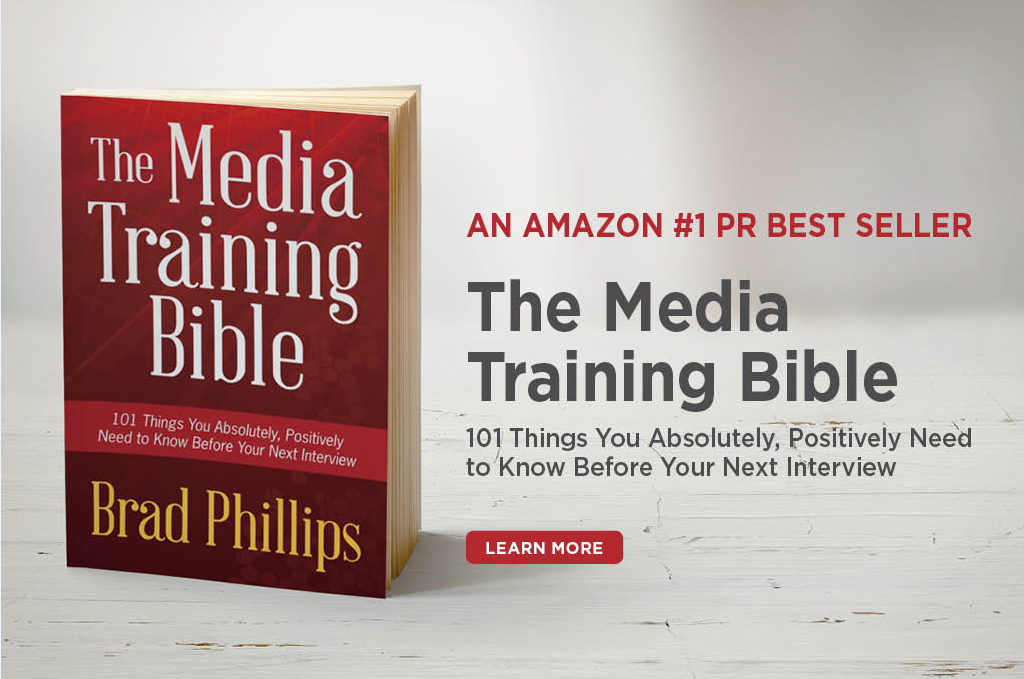Nine Things New Spokespersons Need To Know
If I had to, could I successfully prepare a new spokesperson for his or her first media interview in ten minutes or less?
While it’s true that few beginners can become brilliant media communicators in mere minutes, I am convinced they can jump a couple of spots on a ten scale. For example, someone who might rank as a “four” can leap to a “six” with just a few minutes of advanced preparation.
In this article, I’ll share with you the nine things I would tell a new spokesperson in the few minutes we had together – things he or she absolutely, positively, must know. If you learn nothing else before facing a reporter for the first time, these tips will help you up your game – in just a few minutes.

1. Develop a Message: Little is more important than knowing what you want to communicate during an interview. Quickly jot down the three most important phrases or sentences you want to communicate to the audience.
2. Repeat, Repeat, Repeat: You should articulate at least one of your messages in every answer. You shouldn’t parrot them verbatim, but should communicate the central idea of a message in each response.
3. Transition: There’s no such thing as the “perfect” question. It’s your job as a spokesperson to transition, or “bridge,” from their question to your message. To help you do that, you can use a line such as, “The most important thing to remember is…” or, “Well, what we’re seeing here is….”
4. Don’t Make a New Friend: If you’re 20 minutes into your interview and things are going well, you might think to yourself, “Wow. This isn’t hard at all!” The moment you get comfortable and start thinking the reporter is your friend, you’re going to venture away from your message and make a mistake. The journalist may legitimately be friendly – but she’s not your friend.
5. Speak Everyday English: You may think you sound more credible if you speak with big, jargon-filled words. You won’t – those words just erect a barrier between you and the audience. When speaking with general audiences, use words a bright 12-year-old would understand. You’re aiming for the language of USA Today, not the Wall Street Journal.
6. Don’t Bury Your Lead: When answering a question, don’t lead up to your conclusion. Give the most interesting part of your answer, or your “lead,” first. If you have additional time, you can go back and provide more context – but if you don’t start with your lead, the reporter may cut you off before you get a chance to fully state it.
7. Be Your Most Engaging Self: This sounds like clichéd advice, but it’s not. Most new spokespersons think they have to bury their most engaging traits to come across looking like an “official” or “credible” spokesperson. They usually just look boring. Be your passionate self. Gesture. Convey warmth and smile when appropriate.
8. Speak 10 Percent Louder Than Usual: If you go on television and speak at your usual volume, you will probably sound monotone (this doesn’t apply to professional wrestlers or other unusually loud people). For most of us, TV has a “muting” effect, meaning you have to speak a bit louder just to sound like you usually do. Plus, the boost of volume usually helps animate your body language.
9. Watch Your Tone: If you feel defensive, you will look defensive. Instead of greeting tough questions with panic, welcome them as opportunities to correct the record. Instead of thinking, “Oh, no! Here comes a tough question!” think, “I’m delighted you’re giving me this opportunity to correct that misconception.” Even if you don’t have a perfect answer, the audience will be more inclined to believe a response from a spokesperson who doesn’t come across as defensive.
Continue learning! Read more in The Media Training Bible: 101 Things You Absolutely, Positively Need to Know Before Your Next Interview, available in paperback, for Kindle, and iPad.



I would add to this #10: Don’t be afraid of the silence. If you have given your answer and the reporter is letting you sit in silence for a second, just be quiet. When you start speaking because you feel like the silence is uncomfortable, you are more likely to say something off message or worse, that you’ll regret.
Hi Cheryl,
Thank you for leaving this additional rule — you’re absolutely right. In fact, I regret not making this a top ten list after reading your comment!
Thanks again,
Brad
Thank you for this very informative article. I have an event coming up and will be talking to a few media people. I hope I remember your advice. Rule #10 will be the most memorable.
I agree that #10 is very important. I have seen reporters use silence to see what happens. Not quite starring contest but just to see how the spokesperson reacts.
Wadi Sawabini
yeah thanks for your advice, But their is also need to maintain eye contact and watch your body language during the interview. be blessed.
Yes, Isaac, you are correct. This list is not intended to be comprehensive — there are far more than nine things to know! I do hope this is a useful starter, though.
Best,
Brad